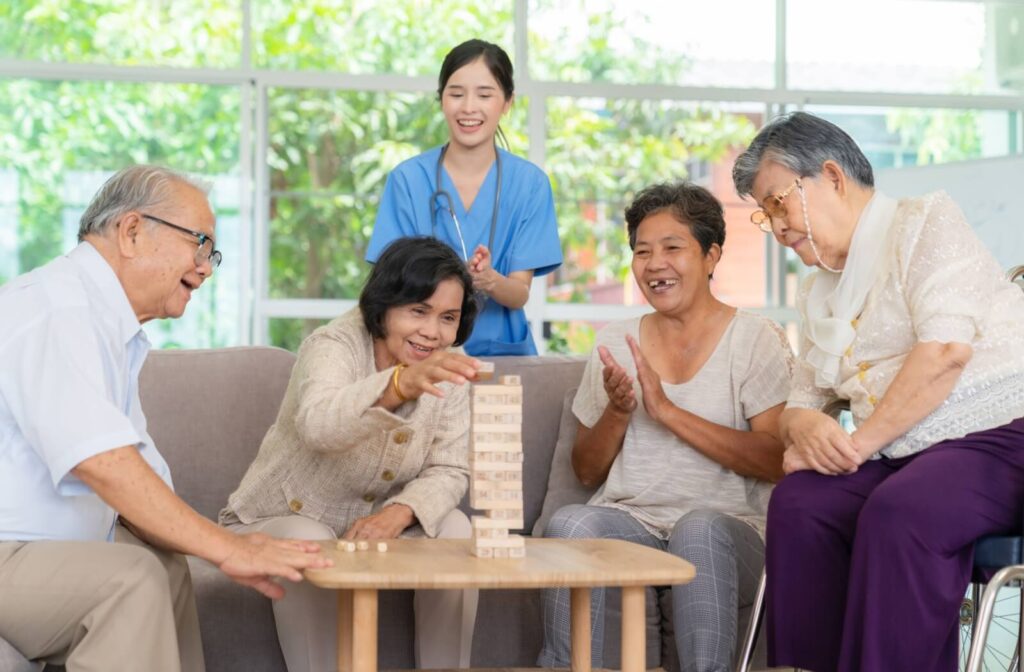Key Takeaways
- Memory care is a specialized form of care designed for individuals with Alzheimer’s, dementia, or other memory-related conditions.
- Memory care goes beyond traditional senior living by focusing on structured routines and therapies that enhance daily functioning.
- Memory care offers secure environments, trained staff, and tailored activities to support cognitive health.
- Families benefit from peace of mind and a high quality of life for their loved ones.
Making decisions about a loved one’s care can feel overwhelming, especially when memory challenges arise. Memory care is specialized care for individuals with Alzheimer’s, dementia, or other memory-related conditions, offering secure environments, trained staff, and tailored activities to support cognitive health.
This type of care goes beyond traditional senior living, focusing on structured routines and therapies designed to improve daily functioning. For families, memory care provides peace of mind and a high quality of life for their loved ones.
Memory Care Services & Amenities
Memory care communities offer comprehensive services designed to support residents’ unique needs while maintaining their dignity and independence wherever possible. These typically include:
Care Services
- 24-hour supervision from trained staff
- Assistance with activities of daily living (such as bathing, dressing, and medication management)
- Specialized therapeutic activities for cognitive wellness
- Nutritious meal planning and dining assistance
- Housekeeping and laundry services
- Personal care coordination
Community Amenities
- Secure environments with monitored entry and exit points to prevent wandering
- Wheelchair-accessible living spaces and bathrooms
- Common areas designed for social interaction and activities
- Garden spaces and outdoor walking areas
- Private or semi-private apartments with safety features
- Emergency response systems
Who Benefits From Memory Care?
Memory care is best suited for individuals who need more support than other forms of senior living, like assisted living, can provide. This includes people who:
- Have been diagnosed with Alzheimer’s disease and dementia, or other memory-related conditions
- Experience confusion about time, place, or familiar people
- Show signs of wandering or getting lost
- Need help with multiple daily activities like bathing, dressing, or taking medications
- Benefit from structured routines and specialized activities
- Require a secure environment for their safety
When Is Memory Care Needed?
Recognizing when it’s time for memory care can be challenging. Common signs include:
- Safety concerns at home, such as leaving stoves on or forgetting to lock doors
- Increasing confusion or agitation in familiar settings
- Difficulty managing medications independently
- Social isolation or withdrawal from activities they once enjoyed
- Caregiver burnout or stress affecting family relationships
The Positive Impact of Memory Care

Quality memory care programs can significantly improve life for both residents and their families. Research shows that specialized memory care environments can:
- Slow cognitive decline through targeted activities and social engagement
- Reduce anxiety and agitation by providing predictable routines
- Improve sleep patterns and overall physical health
- Maintain existing skills and abilities longer
- Provide families with peace of mind and emotional support
The structured environment helps residents feel more secure while still encouraging independence in areas where they’re capable.
A Day In Memory Care
Daily life in memory care revolves around familiar routines that provide comfort and structure. A typical day might include:
- Morning: Gentle wake-up assistance, help with personal care, and a nutritious breakfast in a communal dining room
- Mid-Morning: Cognitive activities like music therapy, art projects, or memory games designed to stimulate thinking skills
- Afternoon: Physical activities such as walking groups or gentle exercise, followed by lunch and quiet time
- Late Afternoon: Social activities like group discussions, pet therapy visits, or gardening
- Evening: Dinner, relaxation activities, and assistance with bedtime routines
Activities are adapted based on each resident’s abilities and interests, ensuring everyone can participate meaningfully.
How to Talk to Your Loved One About Memory Care
These conversations require patience and sensitivity:
- Choose a calm moment when your loved one is most alert
- Focus on positive aspects like making new friends and getting help with daily tasks
- Involve them in the decision-making process when possible
- Visit communities together so they can see the environment firsthand
- Be honest but gentle about safety concerns
- Emphasize that this decision comes from love and wanting the best care possible
Remember that it may take multiple conversations, and their response might vary depending on the progression of their condition.
Taking The Next Steps to Memory Care
If you’re considering memory care, start by:
- Consulting your loved one’s doctor about their current needs and future care requirements
- Researching memory care communities in your area
- Scheduling tours to see different environments and care approaches
- Asking about staff training, resident-to-caregiver ratios, and specific programs offered
- Talking with current families in the community about their experiences
How Shalom Parkside Supports Families with Memory Care
At Shalom Parkside, our Serenity Memory Care program combines expert care with genuine compassion. Our trained staff understand that behind every diagnosis is a person with a lifetime of experiences worth celebrating.
We focus on creating meaningful connections through personalized activities, nutritious dining experiences, and a secure environment where residents can feel at home. Our approach emphasizes what residents can do rather than what they can’t, helping maintain dignity and purpose in daily life.
At Shalom Gardens, we understand that watching a loved one face the challenges of dementia can be deeply emotional, but you don’t have to go through it alone. Here, we celebrate your loved one as a person. Our health and wellness programs, thoughtfully crafted dining experiences, and engaging activities fill each day with opportunities for connection, joy, and growth.
Contact us today to see how memory care can provide the specialized support your loved one deserves while giving your family peace of mind.


